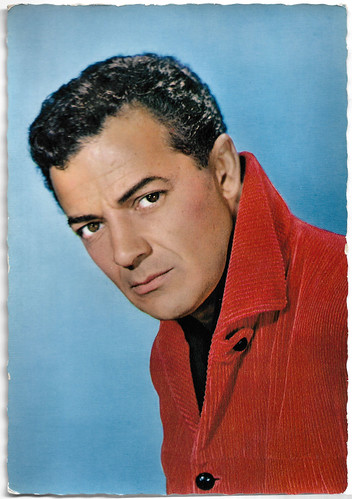
French postcard, no. 117.
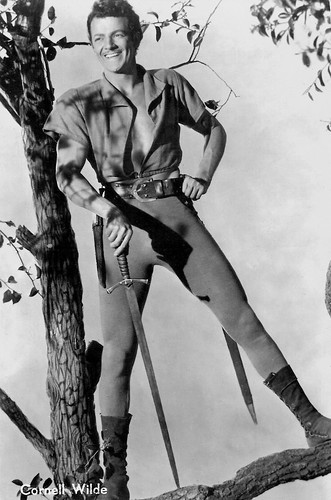
Vintage postcard by PEB. Cornel Wilde in The Bandit of Sherwood Forest (Henry Levin, George Sherman, 1946).

Uruguayan postcard by CF. Photo: 20th Century Fox.

Dutch promotion card by Paramount Pictures. Photo: Paramount Pictures. Betty Hutton and Cornel Wilde in The Greatest Show on Earth (Cecil B. DeMille, 1952). Caption: Acrobatic tours in the skies of the cold-blooded Cornel Wilde and the no less skilled Betty Hutton in one of the most sensational scenes of The Greatest Show of Earth. Further protagonists are Charlton Heston, Dorothy Lamour, Gloria Grahame, and James Stewart.
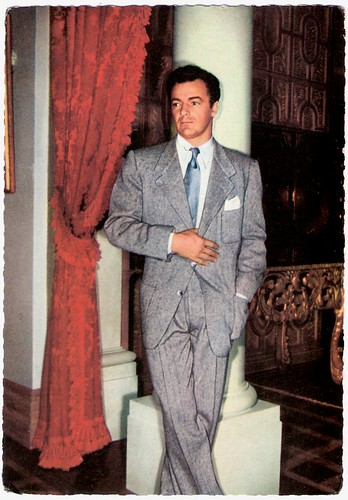
West German postcard by ISV, no. A 12. Photo: 20th Century Fox.
The 18th-most popular star in the United States
Cornel Wilde was born Kornel Lajos Weisz in 1912 to a Jewish family in Prievidza, Hungary, now part of Slovakia. His parents were Vojtech Béla Weisz (later anglicised to Louis Bela Wilde) and Rayna Miryam Vid (Renée Mary Vid). In 1920, he immigrated to New York City with his parents, and his elder sister, Edith. His family Americanised their names and Kornel took the name Cornelius Louis Wilde at the age of seven.
His father was a travelling salesman for a cosmetics firm who did a lot of business in Europe. Wilde spent much of his youth travelling in Europe with him, where he became fluent in several languages. Cornel received a scholarship for medical school. Wilde entered Columbia University, class of 1933, as one of the youngest undergraduates. He fenced for the Columbia Lions fencing team and won the National Novice Foils Championship held at the New York Athletic Club in 1929.
A champion fencer with the U.S. Olympic fencing team, he quit the team just before the 1936 Berlin Olympics to take a role in a play. After studying at Theodora Irvine's Studio of the Theatre, Wilde began appearing in plays in stock and in New York. He made his Broadway debut in 1935 in 'Moon Over Mulberry Street'. He also appeared in 'Love Is Not So Simple', and 'Daughters of Etreus' and toured with Tallulah Bankhead in a production of 'Antony and Cleopatra'. In 1936 he began making small, uncredited appearances in films.
Jim Beaver at IMDb: "In 1937, he married Marjory Heinzen (later known as Patricia Knight), and they both shaved a few years off their ages to get work, Wilde claimed publicly that he was born in New York in 1915, though he continued to list his correct Hungarian birth in 1912 on government documents." Shortening his name to Cornel Wilde for the stage, he appeared in the Broadway hit 'Having a Wonderful Time', but it was not until he was hired in the dual capacities of fencing choreographer and actor (Tybalt) in Laurence Olivier's 1940 Broadway production of 'Romeo and Juliet' that Hollywood spotted him. Although the show only had a small run, his performance in this role netted him a Hollywood film contract with Warner Bros.
He played a few minor roles including a small role in the Film Noir High Sierra (Raoul Walsh, 1941). Then he leapt to fame as Frederic Chopin opposite Merle Oberon as George Sand in A Song to Remember (Charles Vidor, 1945). A Song to Remember was a big hit, made Wilde a star and earned him a nomination for an Academy Award for Best Actor. Columbia promptly used him in two Swashbucklers: as Aladdin in A Thousand and One Nights (Alfred E. Green, 1945) with Evelyn Keyes and as the son of Robin Hood in The Bandit of Sherwood Forest (Henry Levin, George Sherman, 1946). He played the male lead in Leave Her to Heaven (John Stahl, 1945), with Gene Tierney and Jeanne Crain. It was an enormous hit at the box office. Bandit was also a big hit when it was released. In 1946, Wilde was voted the 18th-most popular star in the United States, and in 1947 the 25th.
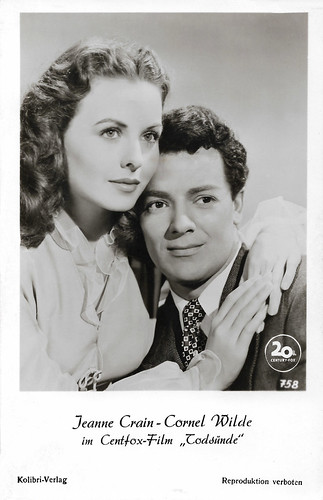
West German postcard by Kolibri-Verlag, no. 758. Photo: 20th Century Fox. Jeanne Crain and Cornel Wilde in Leave Her to Heaven (John M. Stahl, 1945).
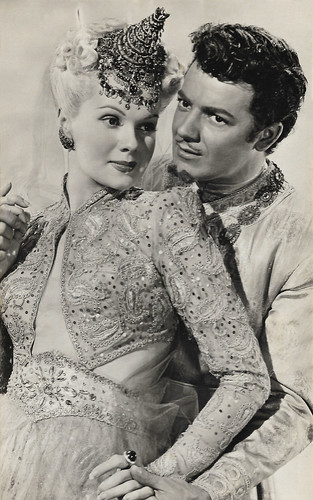
Spanish postcard by Archivo Bermejo, Barcelona, no. 4201 A. Sent by mail in 1949. Photo: Columbia Pictures. Adele Jergens and Cornel Wilde in A Thousand and One Nights (Alfred E. Green, 1945). The Spanish title is Aladino o la lampara maravillosa.

Spanish postcard, no. 741. Cornel Wilde and Ginger Rogers in It Had To Be You (Don Hartman, Rudolph Maté, 1947).
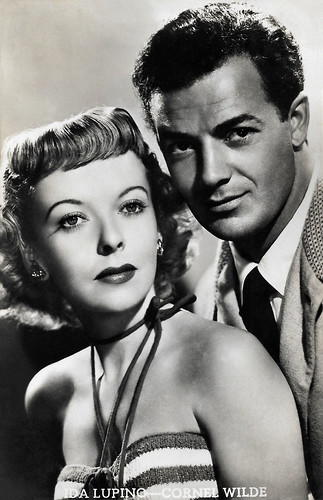
Belgian postcard. Photo: 20th Century Fox. Ida Lupino and Cornel Wilde in Road House (Jean Negulesco, 1948).
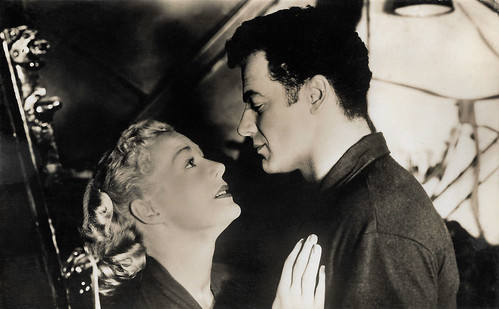
Spanish postcard, no. 2165. Photo: Paramount Pictures. Betty Hutton and Cornel Wilde in The Greatest Show on Earth (Cecil B. DeMille, 1952).
Interesting ventures into Film Noir
In January 1946, Cornel Wilde was suspended by his studio 20th Century Fox for refusing the male lead in Margie (Henry King, 1946). This suspension was soon lifted so Wilde could play the male lead in the studio's big-budget version of Forever Amber (Otto Preminger, Otto M. Stahl, 1947). Filming started, then was halted when the studio decided to replace the inexperienced Peggy Cummins as the female star with Linda Darnell. Wilde refused to return to work unless he was paid more; his salary was $3,000 a week, with six years to run – he wanted $150,000 per film for two films per year. The parties agreed and filming resumed.
Wilde also appeared with Maureen O'Hara in the drama The Homestretch (H. Bruce Humberstone, 1947). He was in a comedy at Columbia with Ginger Rogers, It Had to Be You (Don Hartman, Rudolph Maté, 1947). At Fox, he turned down a role in the musical That Lady in Ermine (Ernst Lubitsch, Otto Preminger, 1948). Not wanting to go on suspension again he agreed to make The Walls of Jericho (John M. Stahl, 1948), from the same director as Leave Her to Heaven but less popular. Road House (Jean Negulesco, 1948) with Ida Lupino, for Fox, was a highly regarded Film Noir and a decent-sized hit.
Wilde made an independent film in Switzerland, Swiss Tour/Four Days Leave (Leopold Lindtberg, 1949) with Josette Day and Simone Signoret. He then left Fox, which he later regarded as a mistake. Divorced from Patricia Knight, Wilde married Jean Wallace in 1951. They had a son and were divorced in 1980. In the 1950s Cornel Wilde's star dimmed a little. The Greatest Show on Earth (Cecil B. DeMille, 1952) was an enormous hit, though Wilde was one of several stars in the film. He settled mainly into adventure films such as Saadia (Albert Lewin, 1953) for MGM, Star of India (Arthur Lubin, 1954) for United Artists and Passion (Allan Dwan, 1954) for RKO.
A growing interest in directing led him to form his own production company to direct his films. Several of his ventures into Film Noir in this period, both his own and other directors', are quite interesting, for example, The Big Combo (Joseph H. Lewis, 1955) and Storm Fear (Cornel Wilde, 1955) with Jean Wallace. As an actor only, he appeared in Hot Blood (1956) with Jane Russell for director Nicholas Ray, and had the lead in Edge of Eternity (1959) for director Don Siegel. Wilde went to Italy to star in the historical drama Costantino il grande/Constantine and the Cross (Lionello De Felice, 1962) with Belinda Lee and Massimo Serato.
In Britain, he wrote, produced, directed and starred in Lancelot and Guinevere (1963). He then produced, directed and starred in The Naked Prey (Cornel Wilde, 1965), a tour-de-force adventure drama that brought him real acclaim as a director. The film was inspired by the experiences of explorer John Colter, who was pursued by Blackfoot warriors through the American frontier in the early 1800s. The film was nominated for an Oscar for its script. His later films were of varying quality. He ended his career in the crime film Flesh and Bullets (1985), written, produced, edited and directed by Carlos Tobalina. It also features Yvonne de Carlo, Aldo Ray and Cesar Romero in minor roles. Cornel Wilde died of leukaemia in 1989, three days after his 77th birthday, leaving behind an unpublished autobiography, 'The Wilde Life'. His son, Cornel Wilde Jr., and daughter, Wendy, were at his side. He is interred in the Westwood Village Memorial Park Cemetery in Westwood, Los Angeles.

Spanish postcard. Cornel Wilde in A Song to Remember (Charles Vidor, 1945).
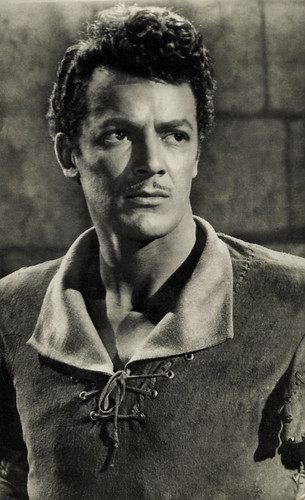
Spanish postcard by Sobe, no. 613. Cornel Wilde in The Bandit of Sherwood Forest (Henry Levin, George Sherman, 1946).

Vintage postcard. Photo: Columbia.
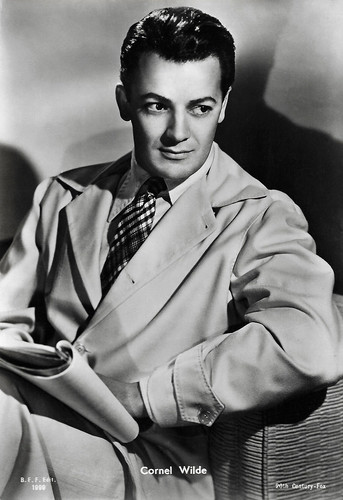
Italian postcard by B.F.F. Edit., no. 1999. Photo: 20th Century Fox.

Italian postcard by B.F.F. Edit., no. 2552. Photo: Paramount Films.

French postcard by Editions P.I., Paris, no. 537. Photo: Metro-Goldwyn-Mayer, 1954.

Vintage postcard by B.F.F. Edit, no. 2028. Photo: 20th Century Fox.
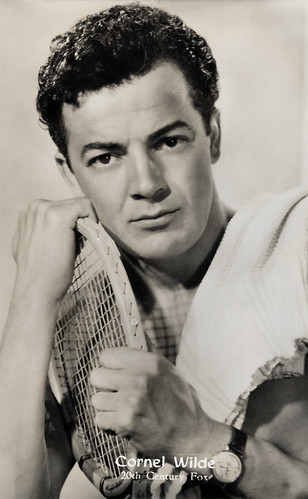
Vintage postcard. Photo: 20th Century Fox.
Sources: Jim Beaver (IMDb), Burt A. Folkart (The Los Angeles Times), Britannica, AllMovie, Wikipedia and IMDb.
No comments:
Post a Comment